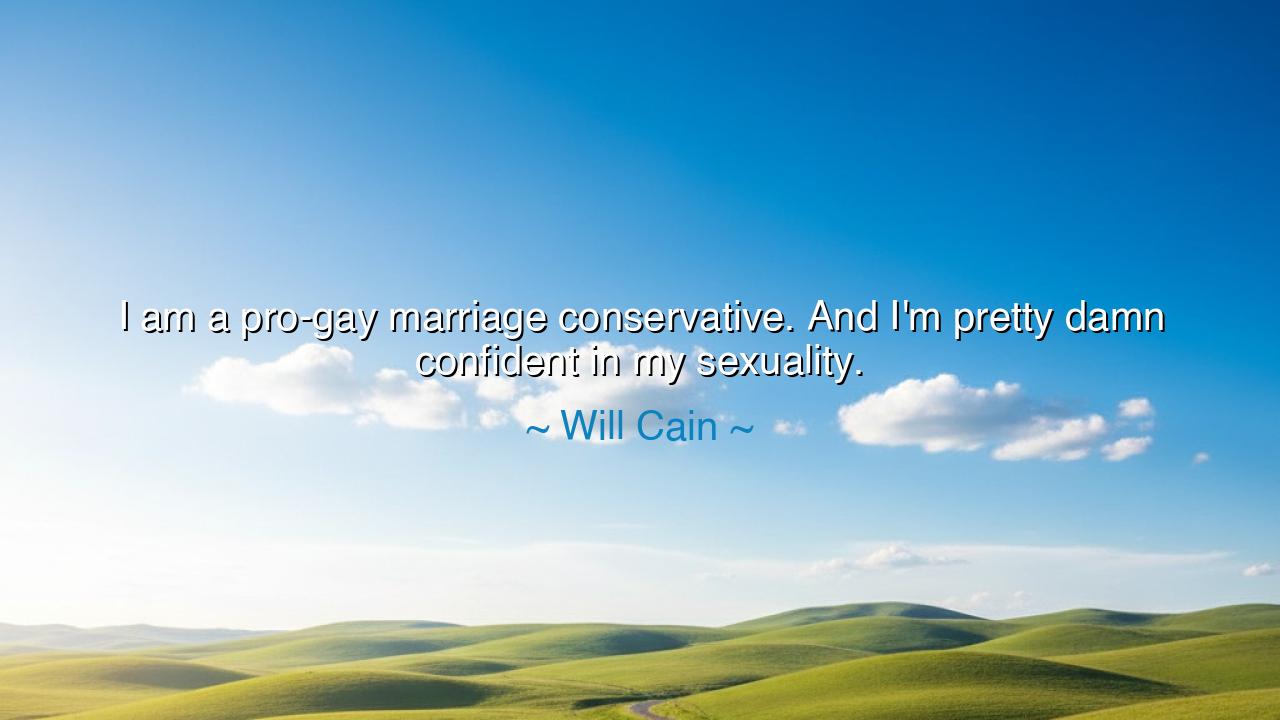
I am a pro-gay marriage conservative. And I'm pretty damn






Will Cain, with a boldness that cuts through the noise of division, declared: “I am a pro-gay marriage conservative. And I’m pretty damn confident in my sexuality.” In this proclamation he weds two ideas that many believe to be opposed: a conservative identity with a defense of marriage equality. His words challenge the rigid boundaries of political tribes, reminding us that conviction and compassion need not be enemies, and that true strength of character comes not from conforming to expectation but from standing firmly in one’s own truth.
When Cain names himself a conservative, he invokes the tradition of honoring history, preserving order, and respecting the wisdom of the past. Yet, in the same breath, he proclaims himself pro-gay marriage, affirming the right of same-sex couples to live in dignity and love. Here lies the heart of his statement: that one can cherish tradition while also expanding it, that one can uphold the value of marriage while refusing to deny it to others. To be conservative, he suggests, does not mean to be narrow; it means to guard what is sacred, and love, at its root, is sacred.
His final declaration, that he is confident in his sexuality, is the keystone of his courage. For many who oppose gay marriage, fear lurks in the background—fear of blurred identities, fear of undermining their own sense of self. Cain cuts through this fear with clarity: his support for others does not diminish who he is. His confidence is both shield and sword, showing that true manhood, true identity, does not tremble when others claim their rightful place at the table of equality.
History gives us echoes of this spirit. Consider Abraham Lincoln, who, though a man of his time and bound by its prejudices, broke ranks with many in his party to push for the abolition of slavery. He did so not because it was convenient, but because it was just. Lincoln too was anchored in tradition, yet he stretched that tradition to include more of humanity within the circle of freedom. Will Cain’s words carry a similar energy: the courage to stand in the middle ground, bridging divides by rooting his convictions in both heritage and justice.
The deeper meaning of Cain’s declaration is a challenge to all who live in divided societies. It is easy to define ourselves by our labels, to let political tribes dictate our every opinion. Yet Cain shows that wisdom comes when we think beyond slogans, when we find the truth that is larger than party or prejudice. His stance reminds us that compassion does not belong to the left or right, but to the human heart, and that courage lies in affirming justice even when it unsettles one’s own camp.
The lesson for us is clear: confidence in one’s identity is the key to respecting the identities of others. If you are secure in who you are, then you can affirm the dignity of your neighbor without fear. If you believe in the strength of your values, then you can expand them to include those who have been excluded. Fear breeds division; confidence breeds generosity. Cain’s words call us to live with such confidence, not shrinking from difference but embracing it as part of the vast design of humanity.
Therefore, let each of us act with both conviction and courage. Stand for your beliefs, but do not let them be chains that bind you from doing what is right. Defend tradition, but never use tradition to deny another’s dignity. Be confident in who you are, so that you may affirm others in who they are. For this is the path of true strength, where identity and justice walk hand in hand.
Thus, Will Cain’s words rise as a teaching for our age: to be conservative, to be progressive, to be human—all these can coexist when rooted in confidence, justice, and love. And if we heed this, we too will learn to bridge divides, honor tradition, and yet extend its blessings to all, making space at the table of life for every soul.






AAdministratorAdministrator
Welcome, honored guests. Please leave a comment, we will respond soon